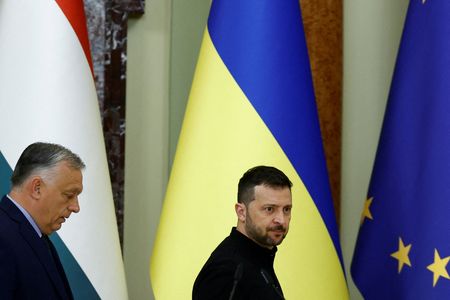BUDAPEST (Reuters) -Hungary said on Monday it was blocking access to 12 Ukrainian news sites after a similar move by Kyiv, worsening relations between the two neighbours, which have been fraught during Russia's invasion of Ukraine.
Earlier this month, Ukraine blocked various websites deemed to contain pro-Russian views at the request of the security services. They included eight Hungarian-language portals, among them a popular pro-government news site, origo.hu.
"A sovereign country must give a proportional response to an entirely unjustified attack," Hungarian Prime Minister Viktor Orban's chief of staff, Gergely Gulyas, said in a Facebook post on Monday, announcing the measure.
Most of the websites targeted by Hungary are widely read in Ukraine. One, European Pravda, closely tracks Ukraine's EU accession aspiration and Hungary's efforts to block that.
Gulyas said Ukraine banned the Hungarian portals because they wrote critically about sanctions against Russia and military support for Ukraine and criticised the European Union and NATO alliance as being fragmented and ineffective.
"If the fragmentation of the European Union provides grounds for state censorship in Ukraine, then it is time for Ukraine to renounce its intention to join," he wrote.
Gulyas said the Hungarian sites were also banned in Ukraine because they "dared to report on the influence activities of the Soros Foundation." Hungarian-born financier George Soros and his liberal views have been a perennial target of Orban's Fidesz party over the past decade.
Orban has been sceptical about Western military aid for Ukraine and has maintained more cordial relations with Russian President Vladimir Putin than other NATO and EU member states.
Ukrainian Foreign Ministry spokesperson Heorhii Tykhyi said there was a distinction in the tit-for-tat blocking moves in that the blocked Ukrainian sites were "fact-based journalism."
"The difference is that Ukraine blocks Russian propaganda, whereas Orban's government blocks Hungarians' access to fact-based journalism," he wrote in English on X. "But for them, the farther from the truth, the better."
(Reporting by Anita Komuves in Budapest and Yuliia Dysa in Kyiv; Editing by Andrew Cawthorne, Ron Popeski and Matthew Lewis)







